This article has tried to cover the most important topic, “Difference Between Distilled And Purified Water.”
What is Purified Water?
Purified water has undergone a process to remove impurities, contaminants, and pollutants, making it safe for consumption or specific applications. The purification process typically involves several methods to eliminate various substances and particles that may be present in the water.
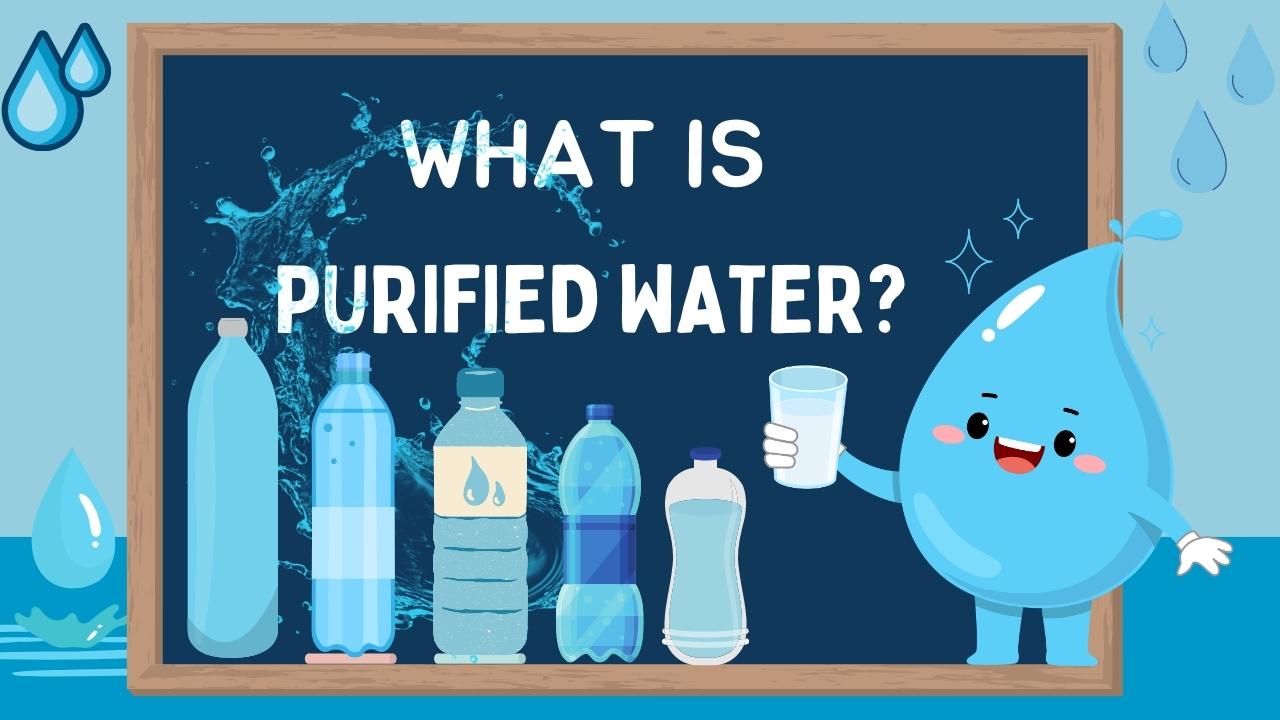
What Is Purified Water?
Common methods used for purifying water include:
1. Filtration: Water is passed through a filter that traps and removes particles and larger impurities.
2. Sedimentation: Allowing suspended particles to settle at the bottom of a container leaves clearer water at the top.
3. Distillation: Water is heated to create steam, condensing into liquid form, leaving contaminants and impurities behind.
4. Reverse osmosis: Water is forced through a semi-permeable membrane that blocks larger particles and impurities, producing purified water on the other side.
5. Ion exchange: This process involves passing water through a resin that exchanges undesirable ions (such as calcium and magnesium) with more acceptable ions (such as sodium) to soften the water.
6. UV treatment: Ultraviolet (UV) light kills bacteria, viruses, and other microorganisms in the water.
The level of purification needed may vary depending on the intended use of the water. For example, water used for drinking purposes requires a higher level of purification to meet safety standards, while water used for industrial processes may have specific purity requirements.
It’s important to note that while purified water is generally safe for consumption, it may lack certain beneficial minerals in natural water sources. As a result, some people prefer to consume mineral-rich water, like spring water or mineral water, to obtain additional nutrients.
The Health Benefits of Drinking Purified Water:
Drinking purified water can offer several health benefits. Some key advantages are provided below:

The Health Benefits Of Drinking Purified Water
Removal of Contaminants: Purified water undergoes filtration processes that remove impurities, including harmful substances such as bacteria, viruses, parasites, heavy metals, chlorine, pesticides, and industrial pollutants. This makes it safer and healthier to consume.
Improved Hydration: Clean and pure water is essential for proper hydration, as it helps maintain the body’s fluid balance, supports organ function, and aids in digestion.
Enhanced Detoxification: Purified water assists the body’s natural detoxification by flushing out toxins and waste products. It can support the kidneys and liver in removing harmful substances from the body.
Better Nutrient Absorption: Drinking purified water can improve the absorption of essential nutrients from your food, contributing to overall health and well-being.
Healthier Skin and Hair: Consuming purified water can lead to healthier skin and hair, as it helps to hydrate and moisturize from within. It may also reduce the risk of skin issues caused by contaminants in water.
Reduced Risk of Waterborne Diseases: Purified water minimizes the risk of waterborne diseases like cholera, dysentery, and giardiasis, often caused by ingesting contaminated water.
Supports Digestive Health: Drinking purified water can aid digestion by promoting a healthy pH balance in the digestive system, preventing issues like acid reflux and indigestion.
Promotes Overall Wellness: Staying hydrated with purified water can boost your immune system and energy levels, making you less susceptible to illnesses and helping you stay more alert and focused.
Weight Management: Drinking purified water can assist in weight management by reducing calorie intake from sugary beverages and promoting a feeling of fullness.
Better Tasting Water: Purified water often tastes better since it lacks the unpleasant odor and taste associated with some contaminants.
It’s important to note that the health benefits of purified water can vary depending on the source and the purification methods used. The most common purification methods include distillation, reverse osmosis, and carbon filtration. To ensure the highest quality of purified water, using reliable and certified water purification systems or consuming bottled water from reputable brands is essential. Additionally, a balanced diet and regular exercise are vital for maintaining good health.
Disadvantages of Purified Water:
While purified water offers numerous health benefits, there are also some potential drawbacks to consider:

Disadvantages Of Purified Water
Removal of Essential Minerals: Some purification methods, such as reverse osmosis and distillation, can remove beneficial minerals like calcium, magnesium, and potassium from the water. While these minerals can be obtained from other dietary sources, losing essential minerals in the water may not be ideal for some individuals, especially in areas with low mineral content in the drinking water.
Acidic Nature: Purified water can be slightly acidic due to the absence of minerals. Regular consumption of acidic water may mildly impact the body’s pH balance. However, the overall effect is typically minimal and not a significant health concern for most people.
Cost: Purification processes can be expensive, especially for large-scale systems or advanced filtration methods. This cost can be passed on to consumers through higher bottled or purified water prices, making it less accessible for some individuals or communities.
Environmental Impact: The production and disposal of single-use plastic water bottles, commonly used for bottled purified water, contribute to environmental pollution. The energy required for water purification and distribution also has an environmental impact, depending on the purification method and energy source.
Risk of Recontamination: While purified water removes contaminants during the purification process, recontamination is possible during storage and distribution if proper hygiene practices are not followed. Bottled purified water, in particular, may be exposed to contaminants during handling and transportation.
Lack of Fluoride: Some purification methods can remove fluoride from water, commonly added to municipal water supplies, to promote dental health. The absence of fluoride in purified water might necessitate alternative sources of fluoride intake, especially for communities without fluoridated water.
Potential for Overconsumption: People might be tempted to consume excessive amounts of purified water because “more is better.” However, excessive water intake can lead to hyponatremia, an electrolyte imbalance caused by low sodium levels in the blood.
Energy Intensive: Certain purification methods, such as reverse osmosis, can be energy-intensive, requiring electricity to operate the filtration systems. This energy consumption can contribute to the overall carbon footprint of purified water production.
Despite these potential drawbacks, purified water remains a safe and healthy option for most people. When choosing a purification method, it’s essential to consider individual needs, the quality of the water source, and the environmental impact of the chosen purification system. Using reusable water bottles and supporting sustainable water management practices can also help mitigate some environmental concerns associated with purified water consumption.
Purified Water Brands in the USA
As of my last update in July 2023, several popular purified water brands are available in the USA. However, please note that brands’ availability and popularity may change over time. Here are some well-known purified water brands in the USA:

Purified Water Brands In The Usa
- Dasani: Produced by The Coca-Cola Company, Dasani is one of the leading bottled water brands in the United States.
- Aquafina: Bottled by PepsiCo, Aquafina is another popular purified water brand known for its widespread availability.
- Nestlé Pure Life: Nestlé Pure Life offers purified water with added minerals for taste and is widely distributed throughout the country.
- Fiji Water: Though known for its artesian water from Fiji, the company also offers a purified water product.
- Essentia: Essentia is a popular brand of ionized alkaline water purified and enhanced with electrolytes for better hydration.
- Smartwater: Produced by The Coca-Cola Company, Smartwater is vapor-distilled and then enriched with electrolytes for taste.
- Deer Park: Owned by Nestlé Waters North America, Deer Park provides both natural spring water and purified water options.
- Ice Mountain: Another Nestlé Waters brand, Ice Mountain offers purified water sourced from various springs in the Midwest.
- Great Value (Walmart Brand): Walmart’s Great Value brand also offers its own line of purified water.
- Poland Spring: Owned by Nestlé Waters North America, Poland Spring provides natural spring water and a purified water product.
Remember to check the labels and ensure the water you choose is labeled as “purified” and has undergone a proper purification process. Always choose reputable brands to ensure the quality and safety of the water you consume. Additionally, local grocery stores and supermarkets often carry store-branded purified water options.
What is Distilled Water?
Distilled water is purified water that has undergone the distillation process. Distillation is a water purification method that involves heating water to its boiling point to produce steam and then condensing it back into liquid form. During this process, impurities, contaminants, and minerals are left behind, and only pure water vapor is collected.

What Is Distilled Water?
The distillation process works as follows:
Heating: The water is heated in a distillation chamber or boiler container until it reaches its boiling point.
Vaporization: As the water boils, it turns into steam, leaving behind most of the impurities and contaminants, including minerals, heavy metals, bacteria, and other substances.
Condensation: The steam rises and moves into a cooling chamber or condenser, which is cooled down. As a result, the steam turns back into liquid water through condensation.
Collection: The condensed water, now purified and free of most impurities, is collected in a separate container called a collection chamber or reservoir.
The distillation process effectively removes contaminants, including bacteria, viruses, chemicals, minerals, and pollutants, producing highly pure water. However, it’s important to note that distillation may not remove volatile organic compounds (VOCs) and some chemicals with lower boiling points than water, as they can vaporize and condense with steam. Therefore, additional purification steps, such as activated carbon filtration, may further enhance the water’s purity.
Distilled water is commonly used in laboratory settings, medical applications, steam irons, humidifiers, and car batteries due to its high purity and lack of mineral content. However, it is not typically recommended for regular drinking water, as the absence of minerals may lead to potential mineral deficiencies if consumed as the primary water source over an extended period. Additionally, distilled water may taste flat compared to water containing natural minerals. For drinking purposes, it’s generally better to consume water with a balanced mineral content that is safe and suitable for everyday hydration.
The Health Benefits of Drinking Distilled Water
Drinking distilled water offers some potential health benefits and certain considerations. Consider these aspects:

The Health Benefits Of Drinking Distilled Water
1. Purity: Distilled water is one of the purest forms of water available, as the distillation process removes most contaminants, including bacteria, viruses, heavy metals, and other impurities. This can make it a suitable choice for certain medical applications and in situations where purity is essential.
2. Low Mineral Content: Distilled water has a very low mineral content compared to other types of water. While this can be beneficial in some cases, such as for people on restricted diets or those who need to avoid certain minerals due to health conditions, it’s important to note that prolonged consumption of low-mineral water may not be ideal for everyone. Minerals like calcium and magnesium are essential for maintaining healthy bones and overall health.
3. Hydration: Distilled water can effectively hydrate the body, similar to other types of water. Staying properly hydrated is crucial for bodily functions, maintaining body temperature, and supporting overall health.
4. Detoxification: The lack of contaminants and impurities in distilled water may benefit certain detoxification protocols or medical procedures requiring pure water.
5. Medical Applications: Distilled water is commonly used in medical equipment, pharmaceutical preparations, and medical procedures where water purity is paramount.
However, it’s important to consider the following points and potential drawbacks:
1. Mineral Deficiencies: Regular and long-term consumption of distilled water as the primary source of hydration may only be recommended for some, as it lacks essential minerals that the body needs. Obtaining the minerals from a balanced diet is crucial for maintaining overall health.
2. Flat Taste: Some people find the taste of distilled water flat or lacking compared to water with natural mineral content. This may make it less appealing for regular drinking.
3. Electrolyte Balance: Distilled water does not contain electrolytes (essential minerals like sodium, potassium, and magnesium), which are crucial for proper nerve and muscle function. Overconsumption of distilled water may lead to electrolyte imbalances, particularly if not balanced with mineral-rich foods in the diet.
4. Environmental Considerations: The distillation process can be energy-intensive and may have environmental impacts, depending on the energy sources used.
In summary, while distilled water has certain benefits, consuming water with a balanced mineral content for regular hydration is generally recommended. Distilled water may be more appropriate for specific medical uses, industrial applications, and situations where purity is essential. However, you must consult with a healthcare professional or nutritionist if you have specific health concerns or dietary requirements for water consumption.
Disadvantages of Distilled Water
While distilled water offers certain benefits, it also has several disadvantages and limitations that you should be aware of:

Disadvantages Of Distilled Water
1. Lack of Essential Minerals: One of the significant drawbacks of distilled water is that it lacks essential minerals such as calcium, magnesium, and potassium. Regular consumption of water without these minerals can lead to potential mineral deficiencies over time. These minerals are crucial in maintaining bone health, muscle function, and overall well-being.
2. Electrolyte Imbalance: Distilled water does not contain electrolytes, which are essential for nerve function, muscle contractions, and maintaining fluid balance. Over time, drinking distilled water exclusively may lead to an electrolyte imbalance, which can adversely affect health.
3. Flat Taste: Many people find that distilled water has a flat or bland taste compared to water with naturally occurring minerals. This can make drinking less enjoyable, potentially leading to inadequate hydration for some individuals.
4. Leaching of Minerals: Distilled water may draw minerals from the body, particularly when mineral content in the diet is already low. This leaching effect is because the water seeks to achieve a balanced state with the minerals in the body.
5. Environmental Impact: The distillation process itself requires significant energy consumption, which can contribute to environmental pollution and greenhouse gas emissions.
6. Cost: Distillation is a relatively expensive water purification method, especially compared to other filtration techniques. This cost can be passed on to consumers when purchasing distilled water.
7. Not Suitable for Infants: Distilled water is not recommended for preparing baby formula. It lacks the necessary minerals and nutrients that infants need for proper growth and development. Instead, parents should use water that meets the guidelines set by health authorities for infant formula preparation.
8. Not Recommended for Regular Hydration: While distilled water can be suitable for specific applications or medical procedures, it is generally not recommended as the primary source of drinking water for regular hydration due to its lack of essential minerals.
In summary, while distilled water may be useful for certain applications, there are better choices for everyday drinking water. It lacks essential minerals vital for overall health, and prolonged consumption may lead to mineral imbalances. It’s generally better to consume water that contains a balanced mineral content or obtain essential minerals from a well-rounded diet. It’s always best to consult with a healthcare professional or a registered dietitian if you have specific concerns or health conditions related to water consumption.
Distilled Water Brands in the USA
As of my last update in July 2023, several companies produce distilled water and distribute it in the USA. Please note that the availability of brands and products may change over time, so checking local stores and online retailers for the most up-to-date information is essential. Here are some well-known distilled water brands in the USA:

Distilled Water Brands In The Usa
Glaceau Smartwater Distilled: Smartwater, produced by The Coca-Cola Company, offers a distilled water option known as “Glaceau Smartwater Distilled.”
Great Value (Walmart Brand): Walmart’s Great Value brand includes a range of distilled water products.
Kroger Distilled Water: Kroger, a major grocery store chain, sells its own brand of distilled water.
Essentia Water Ionized 9.5 pH Drinking Water: Although primarily known for its ionized alkaline water, Essentia Water also offers a purified drinking water option.
Culligan Distilled Water: Culligan is a well-known water treatment company that offers distilled water for purchase.
Crystal Geyser Distilled Water: Crystal Geyser is a popular bottled water brand offering distilled water and other types of water.
Nestlé Pure Life Distilled: Nestlé Pure Life, a well-known bottled water brand, provides a distilled water product.
Remember that distilled water is primarily used for specific applications, such as medical use, scientific experiments, and steam irons. While it can be used for drinking, it’s generally not the best choice for everyday hydration due to the lack of essential minerals. Consuming water containing a balanced mineral content is essential to support overall health.
Before choosing a specific brand of distilled water, consider factors such as product quality, availability, and any potential environmental impact associated with the production and packaging of the water. Additionally, it’s a good idea to check the label to ensure that the water is labeled as “distilled” to guarantee the highest purity level.
What’s The Difference Between Distilled and Purified Water
Below is a table highlighting the main differences between purified water and distilled water:
| Aspect | Purified Water | Distilled Water |
|---|---|---|
| Definition | Water that has undergone various filtration methods to remove impurities, contaminants, and pollutants. | Water that has undergone the process of distillation, involving vaporization and condensation to produce pure water. |
| Production Method | Purification methods can include carbon filtration, reverse osmosis, and UV treatment, among others. | Water is heated to its boiling point to produce steam, which is then condensed back into liquid form. |
| Mineral Content | May contain some trace minerals depending on the purification method used. | Lacks essential minerals and has a very low mineral content. |
| Impurity Removal | Removes impurities, contaminants, bacteria, viruses, and heavy metals, but some minerals may remain. | Effectively removes most impurities, contaminants, bacteria, viruses, and heavy metals. |
| Electrolyte Content | May retain some electrolytes, depending on the purification process. | Lacks electrolytes, which can lead to potential electrolyte imbalances with prolonged consumption. |
| Taste | May have a slightly better taste due to the presence of some minerals. | Can have a flat or bland taste due to the lack of minerals. |
| Uses | Suitable for most everyday uses, including drinking, cooking, and general household applications. | Commonly used for medical and scientific purposes, steam irons, car batteries, and specific industrial applications. Not recommended as the primary source of drinking water. |
| Environmental Impact | Depending on the purification method, it may have varying environmental impacts. | The distillation process can be energy-intensive and may contribute to environmental pollution. |
| Cost | Costs may vary depending on the purification method used. | Distillation can be relatively expensive compared to other water purification methods. |
| Health Considerations | May be a better option for regular hydration, as it retains some beneficial minerals. | Not recommended as the primary source of drinking water due to the lack of essential minerals. Prolonged consumption may lead to mineral imbalances. |
| Popular Brands | Dasani, Aquafina, Nestlé Pure Life, Fiji Water, etc. | Glaceau Smartwater Distilled, Kroger Distilled Water, Crystal Geyser Distilled Water, etc. |
Keep in mind that both purified water and distilled water are generally safe for consumption, but the choice depends on individual needs and preferences. For everyday hydration, water with a balanced mineral content is usually recommended to support overall health.
Is Bottled Water Distilled?
No, not all bottled water is distilled. Bottled water comes in various types, and distilled water is just one of them. There are several types of bottled water that are commonly available:
- Spring Water: Water from a natural spring is typically collected at the source without any additional treatment.
- Mineral Water: Water that contains minerals and trace elements naturally present in the water source. It may be sourced from underground springs or wells.
- Purified Water: Water that has undergone various purification processes to remove impurities, contaminants, and pollutants. Purification methods may include carbon filtration, reverse osmosis, UV treatment, ion exchange, or a combination.
- Distilled Water: A specific type of purified water that has undergone the process of distillation. Distilled water is created by heating it to its boiling point to produce steam, which is then condensed into liquid form, leaving impurities and contaminants behind.
- Artesian Water: Water from an artesian well, which is a well that taps into a confined aquifer where the water is under pressure, causing it to rise to the surface.
- Sparkling Water: Water containing dissolved carbon dioxide creates effervescence or bubbles.
- Alkaline Water: Water with a higher pH level is often created by adding minerals like calcium, magnesium, or baking soda.
When purchasing bottled water, it’s essential to read the label to determine its type. Some bottles may be labeled as “distilled water,” while others may be labeled as “spring water,” “purified water,” or have specific claims about their source or treatment methods. Different types of bottled water cater to different preferences and needs, so choose the one that best suits your requirements.
Distilled water is safe for consumption and generally considered good for you in certain situations and specific uses. Here are some considerations:
Advantages:
- High Purity: Distilled water undergoes the process of distillation, which removes impurities, contaminants, bacteria, viruses, and minerals, resulting in highly purified water.
- Specific Applications: Distilled water is commonly used in medical settings, scientific experiments, and certain industrial processes where ultra-pure water is required.
- Equipment Maintenance: It is commonly used in steam irons, car batteries, and humidifiers, as the absence of minerals helps prevent scale buildup and clogging.
Considerations:
- Lack of Essential Minerals: Distilled water lacks essential minerals such as calcium, magnesium, and potassium. While it is safe to drink occasionally or for specific purposes, it is not recommended as the primary source of drinking water over an extended period, as it may lead to potential mineral deficiencies.
- Electrolyte Imbalance: Prolonged and exclusive consumption of distilled water without obtaining essential minerals from other dietary sources may lead to electrolyte imbalances in the body.
- Taste: Many individuals may find that distilled water lacks flavor or taste because it does not contain minerals.
Best Practices:
For regular hydration and everyday use, consuming water with a balanced mineral content is generally recommended. Drinking water with minerals is important for maintaining overall health, especially bone health, muscle function, and electrolyte balance. Therefore, it’s best to use distilled water for specific purposes, as needed, and rely on purified water or other water sources with a balanced mineral content for daily hydration.
As with any health-related decision, it’s always a good idea to consult with a healthcare professional or a registered dietitian if you have specific health concerns or dietary requirements related to your water consumption. Personalized guidance can be provided based on your unique needs and health conditions.
Is Purified Water The Same As Distilled Water?
Actually, purified water and distilled water are not the same thing. While both types of water undergo purification processes, they use different methods to achieve purity.
Purified Water: Purified water is a broad term that refers to water that has undergone various filtration methods to remove impurities, contaminants, and pollutants. The purification methods can include carbon filtration, reverse osmosis, UV treatment, ion exchange, and more. Purified water may retain some essential minerals and electrolytes, depending on the specific purification process.
Distilled Water: Distilled water is a specific type of purified water that undergoes the process of distillation. In distillation, water is heated to its boiling point to create steam. The steam rises and then condenses into liquid form, leaving impurities and contaminants behind. Distilled water lacks essential minerals and electrolytes since the distillation process removes nearly all substances from the water.
In summary, purified and distilled water are forms of purified water. Still, distilled water is a more specialized form that goes through a specific distillation process, resulting in higher purity without minerals and electrolytes. On the other hand, purified water can be produced through various filtration methods and may retain some essential minerals and electrolytes depending on the specific purification process used.
Which Is the Best Purified or Distilled Water?
The best choice between purified and distilled water depends on your specific needs. Purified water is generally recommended for regular hydration and everyday use due to its balance of purity and essential minerals. Distilled water is best suited for specific applications that require ultra-pure water, such as medical or scientific purposes. Still, it is not recommended as the primary source of drinking water due to the lack of essential minerals.
The choice between purified and distilled water depends on your needs and intended use. Both types of water are safe for consumption and have advantages and disadvantages.
Purified Water:
Advantages:
- Typically contains some essential minerals that are beneficial for health.
- More readily available and commonly used for everyday drinking, cooking, and household applications.
- It may have a more appealing taste compared to distilled water due to the presence of minerals.
Disadvantages:
- The mineral content can vary, counting on the purification process operated.
- Some purification methods may not remove all contaminants, leading to the possibility of trace impurities remaining in the water.
Best for: Purified water is generally considered best for regular hydration and everyday use. It balances purity and essential minerals, making it a suitable choice for most people.
Distilled Water:
Advantages:
- Highly purified and free from impurities, bacteria, viruses, and minerals.
- Ideal for specific applications where purity is essential, such as medical use, scientific experiments, and industrial processes.
- Useful for steam irons, car batteries, and other applications where mineral-free water is required.
Disadvantages:
- Lacks essential minerals, which can lead to potential mineral deficiencies if consumed as the primary water source over an extended period.
- The distillation process can be energy-intensive and may have environmental impacts.
- The flavor can be dull or boring due to the need for more minerals.
Best for Distilled water is best suited for specific applications where ultra-pure water is required, such as certain medical conditions, laboratory use, or industrial processes. It is not recommended as the primary source of drinking water for regular hydration due to the lack of essential minerals.
In summary, purified water is the preferred choice for most people and for everyday hydration. It balances purity and essential minerals, making it suitable for drinking and household use.
Distilled water, on the other hand, is valuable for specific applications that require ultra-pure water but may not be ideal for regular drinking due to the lack of essential minerals.
It’s important to remember that a balanced diet and regular water intake can help you get the necessary minerals for overall health. If you have specific health concerns or dietary requirements, it’s always best to consult a healthcare professional or a registered dietitian to determine the most suitable water source for you.

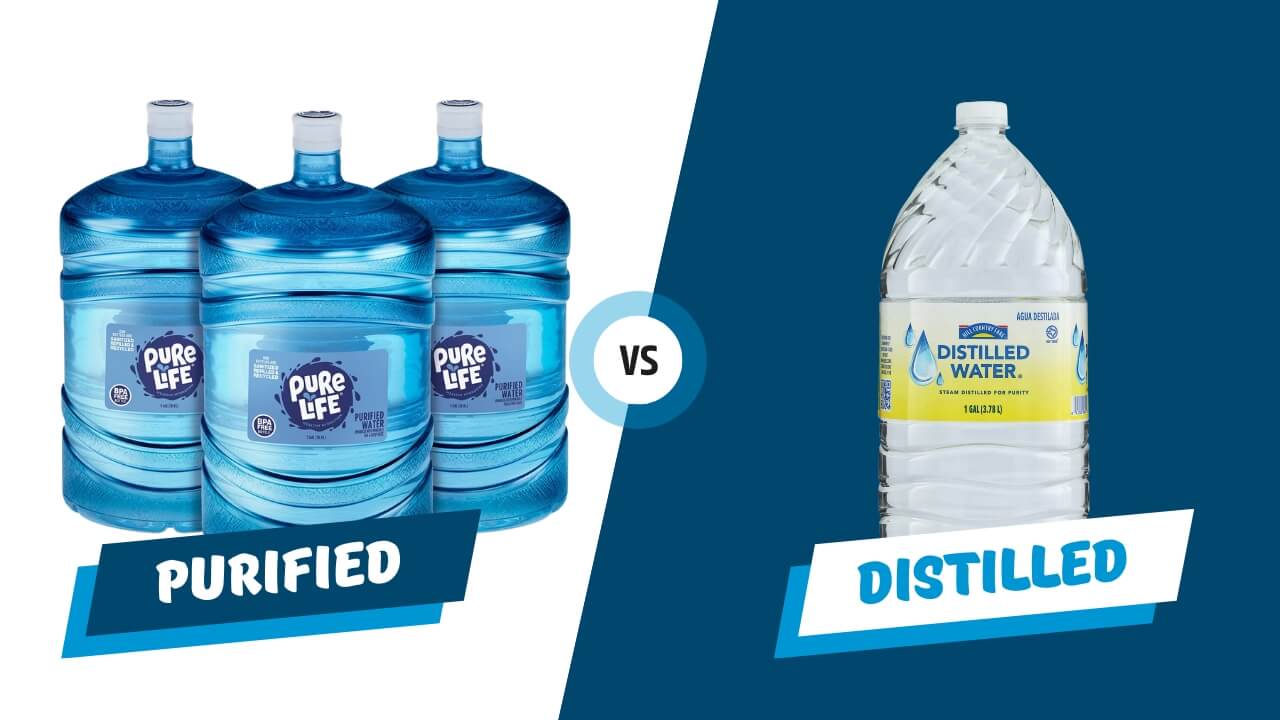


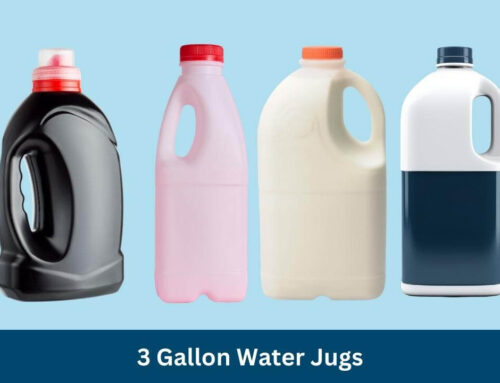
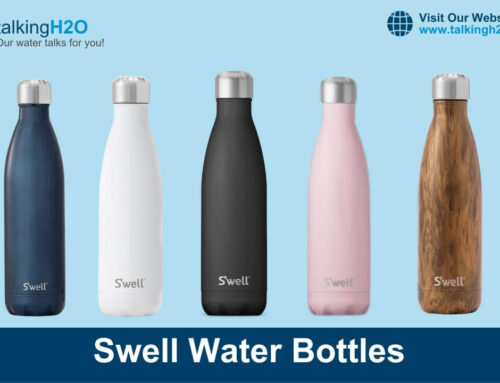

Leave A Comment